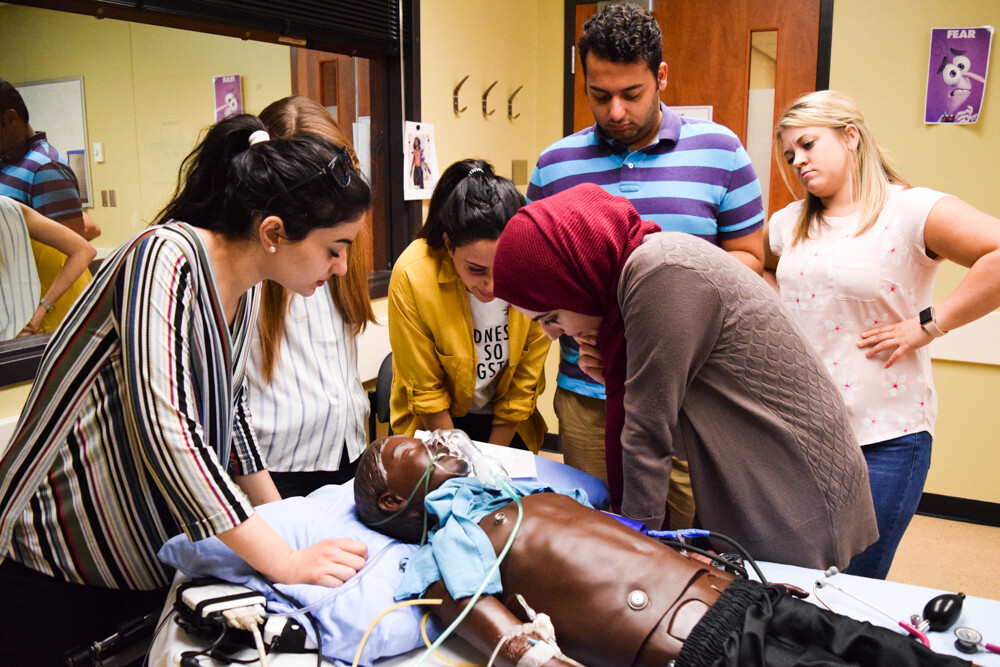Mobile Menu
- Education
- Research
-
Students
- High School Outreach
- Undergraduate & Beyond: Community of Support
- Current Students
- Faculty & Staff
- Alumni
- News & Events
- Giving
- About

Erin Howe
 As they work toward their medical degrees, a dozen students who took part in the International Pediatric Emergency Medicine Elective (IPEME) hope to help heal relations between their nations, while they support their future patients’ health.
As they work toward their medical degrees, a dozen students who took part in the International Pediatric Emergency Medicine Elective (IPEME) hope to help heal relations between their nations, while they support their future patients’ health.
IPEME is a four-week program bringing together a dozen students from Israel, Palestine, Jordan and Canada — three from each country. While focusing on pediatric emergency medicine, the underlying goal is to enhance cross-border understanding, trust and cooperation among a group of future health care leaders.
Leen Dabbas travelled from Amman, Jordan to take part. Now in her final year of medical school, Dabbas says the program helped reignite her long-standing interest in global health.
“There’s more to medicine than being a clinician,” says Dabbas. “Our countries all have similar challenges, like health disparities between urban and rural populations, and we all want to make health care in our respective regions better.”
“We want to create a cadre of changemakers,” says Dr. Shawna Novak, IPEME Director and Executive Director of the Canada International Scientific Exchange Program (CISEPO). “We’re investing in them beyond the four weeks that they spend here. We want to support them as they establish their careers and build capacity in their home countries.”
IPEME is the flagship program of CISEPO — a non-profit organization focused on building international capacity and strengthening health systems through a multilateral cooperative knowledge transfer network — in partnership with the University of Toronto’s MD Program and Division of Pediatric Emergency Medicine, The Hospital for Sick Children (SickKids), Mount Sinai Hospital as well as McMaster University’s Department of Emergency Medicine.
“It’s great that IPEME has a home here at U of T,” says Novak. “We’ve got a diverse community and a variety of academic strengths to share.”
Over the program’s 15 years, 185 students have participated and many now working with organizations like with Doctors Without Borders, Dignitas International and in the field with other global aid agencies. Alumni also become members of the CISEPO collaborative network.
Despite having just completed the program, this year’s IPEME students are already working toward making changes in their respective homelands. As part of the elective, they form small groups comprised of one person from each country. Together, the teams work on a public health project informed by local challenges.
Dabbas’ group’s project, Multinational Initiative for Lactation Consultation Jordan and Palestine — MILC for short — aims to increase breastfeeding rates. Together, they’ve secured space and recruited trainers to establish breastfeeding supports in Amman. Next steps include developing online modules to support lactation consultation training, reaching out to obstetrics and gynaecology leaders at universities within the region and contacting nursing organizations to engage them in the project.
“The only way forward is through cooperation,” says Harvey Skinner, a Professor Emeritus and former Chair of Public Health Sciences (now the Dalla Lana School of Public Health). “In addition to medical education, students also get broader education about social issues and social values. We provide a safe space where they can raise issues and begin to develop a mutual understanding.”
Skinner is also Chair of CISEPO’s Board of Directors and leads a workshop during IPEME on practical techniques for managing stress and trauma. He is also the Founding Dean of the Faculty of Health at York University.
“The students who take part in IPEME have exceptional resumes. They’re already strong leaders,” says Skinner. “Think of what they’ll do when they go back, keep connected and become leaders in their own communities.”
Dabbas and her IPEME classmates are well on their way.